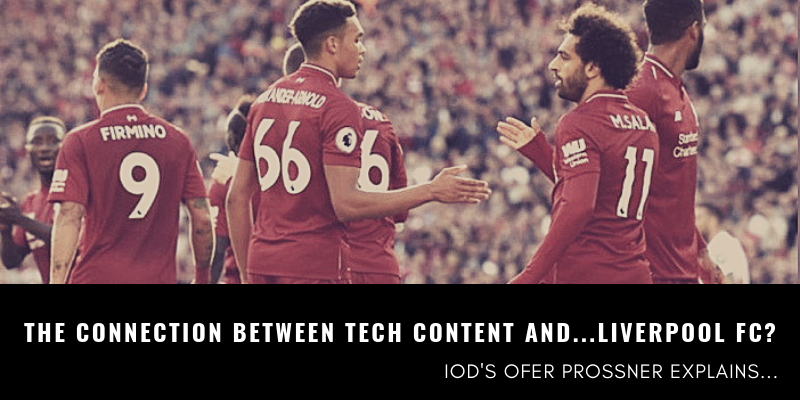What I really want to do in this article is perform a deep dive into a company’s content costs, in particular compare the perception of cost vs. the actual. So, obviously, what I first need to do is turn to my favorite subject in the whole wide world: soccer.
What Does Liverpool FC Have to Do With Content Costs?
My father and my brother, both diehard Liverpool FC fans, have been engaged in a heated argument for the entire last season. My father claims that Jurgen Klopp, the German manager of the Anfiele club, is not that good, that his in-game management skills are subpar. My brother doesn’t understand what the hell my father is talking about and doesn’t miss the opportunity to tell him as much. (They have the same argument over last season’s performance of Mo Salah, the prolific Egyptian striker who, my father says, “isn’t as good as he was last year.”)
Their argument is a futile one, though. Why? Because evaluating performance, even in sports, comes with some subjectivity — especially for fans. During the 2018/19 season, for example, Klopp’s team accumulated the third highest points tally ever recorded in the premier league, which would have brought the team an easy title in almost any given season, except for last season, and this season. One point was missing, and Liverpool came in second. (My father uses this as evidence that he’s right: Klopp wasn’t good enough to win a championship, he says.)
One of the reasons debates over sports are really fun is because there is a distinct difference between winning a championship and being the best team. Sports, if you think about it for a second, are being played in a system (a league) which is a construct developed some time way way back, to hold a tournament over specific periods of time, to determine a winner. Except “winner” doesn’t mean the “best player” or the “best team.” It represents who was best able to succeed under a specific set of rules and conditions.
Liverpool won the prestigious UEFA Champions League in June, but does that make them better than Manchester City, the Premier League Champions who also played in the Champions League? We will only know once the new season starts in August.
But what does this have to do with the topic in question — the costs of producing marketing content? Well, simple: while we love to think about costs as an objective measure, it’s not. Just as with any product, there is the “going rate.” And so you could say, “The going rate to produce a 1500-word blog post is $X.” But you can also say the going rate for apples is $1.50/lb and then head over to Whole Foods where you will find conventional apples and organic apples. Then you will find Fuji apples or Pink Lady or Macintosh or Honey Crisp, and do you even know why the Honey Crisp are so damn expensive? (I don’t know because in Israel we have only apples and only in season.)
Sometimes, when we present our rate card to a potential new client, his response is that the price is “high.” He may add something along the lines of, ”I’ve checked with some of your competitors and your prices are definitely higher than what they are charging.”
What I am starting to become bold enough to ask them in response to this is: “Do you really know what you are getting for that price from each vendor? Have you produced content out-of-house before? Have you ever worked with a freelancer? An agency? Do you know the difference? Do you know their quality assurance process?”
The Apples to Apples of Content Creation
I know how easy it is to compare one content provider with another, especially when you are under pressure to find a solution to your in-house challenge, and when you are working with a limited or highly scrutinized budget. But not every article is the same, nor is every process to arrive at the finished article. When we inquire and learn from the potential client what their previous experiences have been like, we will hear responses like these:
“The writer was okay, but I had to ask our CTO to review it every time and beef up the tech. It would take him 3-4 hours every time.”
”I started working with a writer on this article three months ago, but half way through the process, he dropped the project to take a full-time job. I had to get another freelancer, give him all the background I gave the first one. And the final project is jumbled and incoherent.”
”He created one article a month for us. The articles were always good. But one article a month is all he had the bandwidth for and I need a lot more than one.”
These are real-life examples of challenges I’ve heard. And frankly, I’ve heard versions of the above from others. They all give you a little insight into why there is no objective cost for content.
You Get What You Pay For
The first response shows us that above and beyond the article price, you need to factor into your budget the internal costs of review and writing done by the CTO. No, you might not need to pay the CTO from your marketing budget, but don’t think his time won’t cost you. It won’t be long before the CTO asks you why he has to spend so much time on an article you’re responsible for producing or having produced. He will also likely say some version of, “What are we even paying that writer for?”
The second is a little more difficult to equate to cost, but think about what happens to content that two people worked on. First of all, your time is money. And to have to explain the project twice to someone takes your (or someone’s) time. But also think about your cadence and the impact in your traffic due to the delay of this piece.
Then there is the third answer, which we hear from companies who have typically already seen some good results from producing expert-based content, and their CMO is asking for more. Who’s going to write the additional pieces? Even if you have internal resources (ie. developers who like to blog), who’s going to edit them and make sure they have the right tone and voice for your blog? Likely, you. You are going to have to do a close editorial review of every article, and probably even before that you are going to have to come up with topics, an outline, and an article brief, to make sure the developer knows exactly what to write about.
These are the not-so-obvious costs of content creation that you should be paying attention to and considering when hiring a freelancer or an agency to produce your content. Do you know what you are getting when you hire a freelancer writer? Same question for the agency who you have on retainer.
Bottom Line
A lot of times we think of costs in terms of the price tag. This is especially true in the content industry where marketing professionals are pressed to publish and “just need the piece to be finished already.” But please always take into consideration what’s required to get in-hand a publishable final piece. Cutting corners almost always produces a subpar deliverable.
My brother and father will continue to argue about soccer — since they’re both right and both wrong — and anyway part of the fun of being a sports fan is to argue with someone you love about it! But as marketing professionals, you can avoid pitfalls and paying for something you’re not really getting by asking some pointed questions when interviewing your next writer or content provider. IOD will be happy to answer any and all of your questions. And we will always be forthcoming when we aren’t sure of the answer. So, hit me up!

